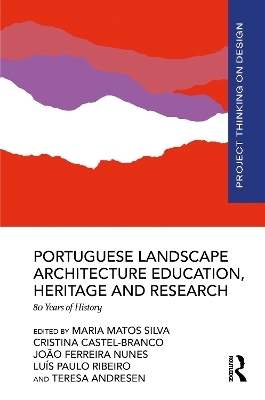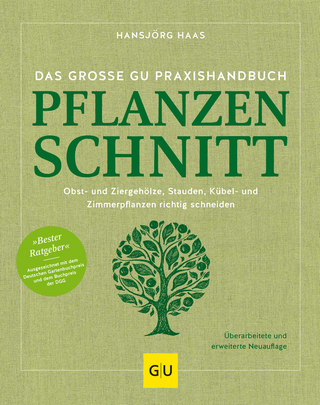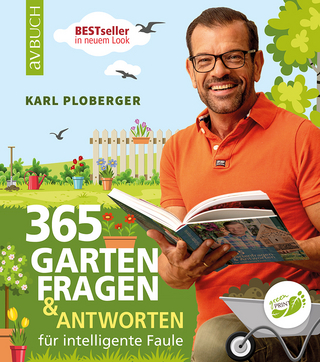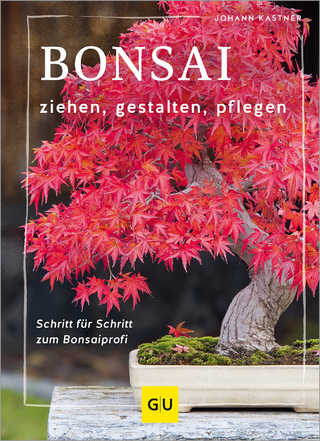
Portuguese Landscape Architecture Education, Heritage and Research
Routledge (Verlag)
978-1-032-59288-6 (ISBN)
In 2022, the Landscape Architecture course in Portugal celebrated 80 years of existence. This edited collection, Portuguese Landscape Architecture Education, Heritage and Research, commemorates this important milestone by bringing together some of the most respected names in Portuguese Landscape Architecture.
Although the book’s content is targeted at the assessment of the Portuguese history and influence, the themes under analysis are all-encompassing within the major fields, namely pedagogy; heritage; theory and methods; and design and landscape planning and management. The book seeks to address several research questions, including
How has Landscape Architecture evolved in Portugal and how has it been revealed in the different disciplinary areas and educational institutions, particularly considering the great challenges of today?
What legacy did Cabral, Sousa da Câmara and the first generation of landscape architects leave us that can be identified in the theory and practice of research projects, recent or ongoing, carried out by Portuguese landscape architects?
How has the education, research and practice of Landscape Architecture in Portugal been influenced or reflected by the exchange of knowledge with other countries?
This book will be of interest to researchers and students, as it encompasses an extensive contribution to the field of Landscape Architecture studies, aiming to impact both on the theory and practice of the discipline.
The Open Access version of this book, available at http://www.taylorfrancis.com, has been made available under a Creative Commons Attribution (CC BY) 4.0 license.
Maria Matos Silva, Assistant Professor of Landscape Architecture (LA) at Instituto Superior de Agronomia (ISA-UL), is currently coordinating the master’s Programme in LA (2022–). She has a degree in LA from ISA-UL (2007), a master’s degree (2010) and PhD (2016) from the University of Barcelona, where she focused on urban and public space design. She has been a research associate of Centro de Investigação em Arquitectura, Urbanismo e Design (CIAUD) at the Faculty of Architecture, UL since 2016. She was awarded an Honourable Mention in the Scientific Prize of the UL/CGD (2019) and is co-PI of the "MetroPublicNet" FCT research project. Cristina Castel-Branco is a landscape architect and professor at the University of Lisbon. As a Fulbright student, she received an MLA from UMass and obtained her PhD in the history of garden art. She has published on subjects in Landscape Architecture history, restoration, and ecological design. She is founder and the first president of the Historic Gardens Association; director of the Botanical Garden of Ajuda (1997–2002) and is a member of the UNESCO-ICOMOS cultural landscapes. She maintains a professional practice in Lisbon, the ACB studio, which has been prize-winning since 1990. She was granted the award of Officier des Arts et des Lettres in 2015 and the Japanese Government Praise of Merit in 2020. João Ferreira Nunes is a landscape architect with a great passion for drawing and understanding the processes of the world. The founder of PROAP, his professional and teaching activities intertwine and contribute to the development of new lines of research and experimentation. He is full professor at the Accademia di Architettura in Mendrisio, Switzerland and visiting professor at international universities. Luís Paulo Ribeiro, Assistant Professor of Landscape Architecture (LA) at Instituto Superior de Agronomia (ISA-UL), has been lecturing since 1999. He obtained his degree in LA at ISA-UL, and his PhD from the University of Massachusetts, USA (1997). He is a founding partner of TOPIARIS (1988), an expert in the restoration of historical gardens and a coordinator of related projects, such as the Tropical Botanical Garden of Lisbon. He is head of the master’s and PhD programs in the LA department and a regular invited lecturer at the University of Massachusetts, where he was awarded the 6th Fábos Medal for the excellence of his work on Greenway planning and design. Teresa Andresen is a landscape architect and agricultural engineer (CLAP, 1982; EA, 1982). She has been a professor in higher education for 30 years and was a member of the Scientific Council of the European Environment Agency from 2002 to 2008; president of the European Foundation for Landscape Architecture from 2004 to 2007; vice president of the International Federation of Landscape Architects (2007); and Portuguese Expert at the Permanent Commission for World Heritage (UNESCO) from 2014 to 2017. He has been a member of the National Council for Environment and Sustainable Development since 2013 and president of the Board of AJH–Portuguese Association of Historic Gardens since 2017.
List of illustrations
List of contributors
Acknowledgements
Foreword I
Bruno Marques
Foreword II
João Ceregeiro
Introduction: Three principles of ecological thinking for an interpretation of Portuguese Landscape Architecture education, heritage, and researchMaria Matos Silva
Methodology and review processMaria Matos Silva and Anubhav Goyal
PART I
Heritage and history of Portuguese Landscape Architecture: A time frame for Landscape ArchitectureTeresa Andresen
1. Historic gardens as cultural heritage. From early debates to future initiatives
Teresa Portela Marques and Maria José Curado
2. Gonçalo Ribeiro Telles: Landscape architect, ecologist and politician in Portugal
Domingas Vasconcelos, Paulo Farinha-Marques and Francisco Castro Rego
3. Francisco Caldeira Cabral and the "Panorama" magazine: Introducing a landscape conscience in tourist propaganda
Gonçalo Duarte Gomes
4. Landscape Architecture education in Portugal and Italy. The pioneering approaches of Francisco Caldeira Cabral and Pietro Porcinai
Ludovica Nardella
5. Landscape Architecture in Portugal: The quest for a needed memory
Maria João Fonseca
6. Lisbon city gardeners, from horticulture to Landscape Architecture (1840-1960) Cristina Castel-Branco, Ana Raquel Cunha and Ana Luísa Soares
7. From historical research to urban ecology: A new perspective on the evolution of landscape art
Ana Raquel Cunha, Maria Manuel Romeiras, Miguel Brilhante, Francisco Castro Rego and Ana Luísa Soares
8. Thirty years of research in green infrastructure and landscape planning
Inês Adagói, Natália Cunha, Ana Müller, João Silva, Leonor T. Barata, Manuela R. Magalhães, Selma B. Pena and Luísa Franco
PART II A Portuguese context on education and pedagogy in Landscape Architecture: Landscape Architecture: Heading to a comprehensive logical/rational, aesthetic, and ethic approachLuís Paulo Ribeiro
9. Teaching restoration of historical gardens: Research through design experience
Cristina Castel-Branco and Sónia Talhé Azambuja
10. Nature-based solutions in the teaching of landscape design by Manuel de Sousa da Câmara
Paulo Farinha-Marques
11. The legacy of three generations of architects-professors: Francisco Caldeira Cabral, Manuel de Sousa da Câmara, and João Ferreira Nunes
Eduardo J.S.C. Pinto
12. Landscape Architecture and urban ecology research as means for knowledge transfer on urban resilience in Maputo, Mozambique
Ana Beja da Costa
13. Breaking siloes and embracing the future: Western and Indigenous lenses in the education of landscape architects
Bruno Marques and Jacqueline McIntosh
14. From the concept of cultural landscape to its application in conservation policies and higher education in Portugal
Raquel Carvalho, Teresa Portela Marques and Cristina Castel-Branco
Part III
Portuguese perspectives on theory and methods in Landscape Architecture. Theory versus circumstances: The Help of Methods in Landscape ArchitectureCristina Castel-Branco
15. In between revolutions: Drivers of landscape change in Interior Alentejo from the Liberal Revolution to the April Revolution
Isabel Martinho da Silva
16. Urban adaptation strategy for the Tinto riverscape, at watershed scale, towards its multifunctionality and hydrological resilience—impacts and governance challenges
Diana T. Fernandes, Maria José Curado and Rodrigo Maia
17. Diversity of street trees in Lisbon, towards city sustainability
Ana Luísa Soares, Leónia Nunes, Inês Duarte, Ana Júlia Francisco, Davide Gaião, Francisco Castro Rego and Susana Dias
18. Contributions to the integration of socio-cultural landscape assessment methods in the learning process
Lígia Vaz de Figueiredo, Isabel Loupa Ramos, Maria da Graça Saraiva and Fátima Bernardo
19. Multiscalarity, interdisciplinarity, and research-by-design towards a metropolitan landscape
Ana Beja da Costa, Wim Wambecq and João Rafael Santos
PART IV Conclusion: Landscape Architecture and the practice of ecological thinking: Considerations for the next 80 years of history
Maria Matos Silva and João Ferreira Nunes
Index
| Erscheinungsdatum | 10.07.2024 |
|---|---|
| Reihe/Serie | Project Thinking on Design |
| Zusatzinfo | 17 Tables, black and white; 43 Line drawings, black and white; 35 Halftones, black and white; 78 Illustrations, black and white |
| Verlagsort | London |
| Sprache | englisch |
| Maße | 156 x 234 mm |
| Gewicht | 790 g |
| Themenwelt | Sachbuch/Ratgeber ► Natur / Technik ► Garten |
| Reisen ► Reiseführer ► Europa | |
| Naturwissenschaften ► Biologie ► Ökologie / Naturschutz | |
| Sozialwissenschaften ► Soziologie ► Spezielle Soziologien | |
| Technik ► Architektur | |
| ISBN-10 | 1-032-59288-5 / 1032592885 |
| ISBN-13 | 978-1-032-59288-6 / 9781032592886 |
| Zustand | Neuware |
| Informationen gemäß Produktsicherheitsverordnung (GPSR) | |
| Haben Sie eine Frage zum Produkt? |
aus dem Bereich


